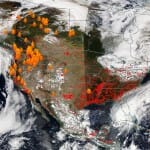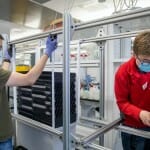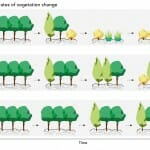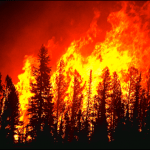Tag Climate change
One-minute data from UW helps NASA detect wildfires faster
Researchers at UW–Madison's Space Science and Engineering Center are delivering up-to-the minute satellite data to NASA to assist efforts tracking and monitoring wildfires. Read More
One hundred acres of beauty
A visual tour of 100 acres of land being restored and conserved by UW–Madison's Susan and Steve Carpenter. Read More
Shifting food choices reducing climate impact of American diet
Lower consumption of beef, dairy, chicken, pork, and eggs accounted for more than 75% of the observed diet-related carbon dioxide savings during the study period. Read More
UW–Madison’s ultra-efficient carbon capture tech earns top 60 spot in global XPRIZE challenge
Team members are forming a company and actively seeking additional funding from venture capitalists and other sources. Read More
Melting ice caps may not shut down ocean current
Building upon previous work, researchers are revising their understanding of the relationship between Atlantic Meridional Overturning Circulation and freshwater from melting polar ice. Read More
UW–Madison professor shapes UN report on climate change
The latest Intergovernmental Panel on Climate Change (IPCC) report urges immediate action to limit greenhouse gas emissions in all sectors of the economy, including energy, transportation, construction, manufacturing and agriculture. Read More
Ancient example of modern global warming was too hot for tiny, important ocean creatures
During another time in which Earth warmed rapidly in conjunction with a spike in atmospheric carbon similar to our modern climate, seawater temperature and chemical changes decimated an important piece of the food web in the tropical Pacific Ocean. Read More
Coral skeleton formation rate determines resilience to acidifying oceans
A new UW–Madison study has implications for predicting coral reef survival and developing mitigation strategies against having their bony skeletons weakened by ocean acidification. Read More
Student’s innovative climate research could change building design
“By the end of the 21st century, building cooling in Madison will be very similar to Montgomery, Alabama,” says Nelson Institute graduate student Gesangyangji. That startling realization motivated her to research how projected climate data can inform building energy design. Read More
Algae blooms a problem but not a trend, study finds
“For many, many lakes, they are a very serious problem,” says Grace Wilkinson of the UW–Madison Center for Limnology. “But algal blooms are not getting worse everywhere." Read More
Educators publish free workbook to help instructors teach climate change science
The online workbook integrates existing science curriculum subjects — such as heat, light, energy, and acids and bases — into a discussion of the properties and effects of greenhouse gases. Read More
Earth’s vegetation is changing faster today than it has over the last 18,000 years
The research suggests that humanity’s dominant influence on ecosystems that is so visible today has its origin in the earliest civilizations and the rise of agriculture, deforestation and other ways our species has influenced the landscape. Read More
Invasive species often start as undetected “sleeper populations”
The finding has important implications for the way we approach invasive species control and management, researchers say. Read More
UW researchers’ evaluation puts MGE net-zero carbon goal on path to limit global warming
If actions similar to the Wisconsin utility's plan were also taken around the world, the researchers say, "it would be effective at keeping the planet under 1.5 degrees warming.” Read More
Cellular networks vulnerable to wildfires across U.S.
More than 430,000 cell network transceivers covering approximately 85 million people are in areas the U.S. Forest Service considers at moderate or high wildfire risk. Read More
Storing carbon dioxide underground may be feasible for helping achieve climate goals
A new study shows that underground reservoirs currently have capacity to store enough atmospheric carbon dioxide to limit planetary warming to under two degrees Celsius (35.6 degrees Fahrenheit) relative to pre-Industrial temperatures by the year 2100. Read More




















